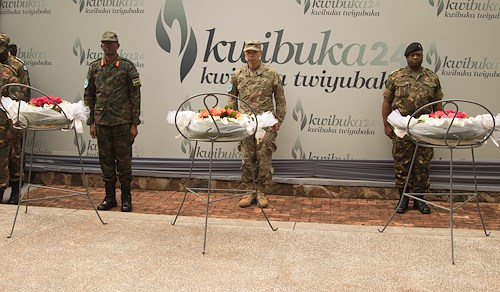Gallery contains 1 image
×
Photo 1 of 1
Shared Accord 18 participants get a history lesson
Maj. Gen. Innocent Kabandana (left), Brig. Gen. Lapthe Flora (center), and Brig. Gen. Simon Barwabatisle reaffirmed their mutual commitment to peace Friday as they laid wreaths on the tomb of 250,000 victims of the 1994 Genocide at the Kigali Genocide Memorial Centre during Shared Accord, Aug. 25, 2018. SA18, sponsored by U.S. Africa Command and executed by U.S. Army Africa (USARAF), trains participants on U.S., U.N., and African Union mandated peacekeeping operations by replicating real-world scenarios from the U.N. mission in the Central African Republic – Multidimensional Integrated Stabilization Mission in the Central African Republic (MINUSCA).
Photo by: Cpt. Olivia Cobiskey
KIGALI, Rwanda – Both men have been witness to the human capacity for evil.
Maj. Gen. Innocent Kabandana, as a young lieutenant during the 1994 genocide in Rwanda, and Brig. Gen. Lapthe C. Flora, as a young man fleeing mass killings under communist rule in 1979 in Vietnam.
The generals reaffirmed their mutual commitment to peace Friday as they laid wreaths on the tomb of 250,000 victims of the 1994 Genocide at the Kigali Genocide Memorial Centre.
Brig. Gen. Flora, deputy commanding general, U.S. Army Africa, said at the end of the day he hopes that participants understand the importance of building partnership and cooperation between nations. To establish a secure, stable, and prosperous African continent, is paramount to ensuring that history does not repeat itself, he added.
“The work peacekeepers do is noble; they are the guardians of peace and a beacon of light for those alone in the darkness,” said Flora, who spent a year in three separate refugee camps after fleeing Vietnam as a young man. “I know I was one of those in the darkness.”
“You never know whose life you touch. That child you help as a peacekeeper might grow up to be the next president of the country.”
The nearly 200 service members on the tour are here in Rwanda as part of Shared Accord 18, a military exercise that is used to help troop contributing nations develop fully-trained, fully-equipped, and fully-qualified soldiers for U.N. missions in Africa
Participants, from 15 countries from North America, Europe and Africa, spent the day at the memorial and the Campaign Against Genocide Museum learning about how genocide is used as a weapon of war – to include rape.
According to Amnesty International, the use of rape during war is not a by-product of conflict, but a pre-planned and deliberate military strategy to first instill terror in the civilian population and second to make reconciliation more difficult by inflicting humiliation and shame on the targeted population.
Col. Charles Johnson, a pilot in the Botswana Defense Force, agreed the use of rape as a weapon against the civilian populations has increased in the last century. Journalists and human rights organizations have documented campaigns of genocidal rape not only during the 1994 Genocide in Rwanda, but conflicts in the former Yugoslavia, Sierra Leone, Liberia, Sudan, Uganda, and in the Democratic Republic of the Congo.
“Our training emphasizes holding the perpetrators of these crimes against women accountable,” said Johnson, a script writer for the command post exercise used by U.S. Army Africa to help train future peacekeepers for the U.N. mission in the Central African Republic – Multidimensional Integration Mission in the Central African Republic (MINUSCA) in Rwanda, August 14-30. “Training can only enhance operational capability – training, training, training.
“Training not only happens during the exercise,” he added after visiting the Kigali Genocide Memorial. “It’s also preparing you emotionally, academically and gives you the will. If you do not have the will, you will not be able to execute your mandates.”
One of those U.N. mandates is to provide specific protection for women and children affected by armed conflict, particularly through the deployment of Child Protection Advisers, Women Protection Advisers, and Gender Advisers.
Lt. Col. Ethel Kunda, an operations officer in the planning division of the Zambian Defence Force, find the children’s memorial the most difficult to visit.
“It was a really sorrowful moment to hear and see what this country went through,” said Kunda, who has served in both MINUSCA and the United Nations Organization Stabilization Mission in the Democratic Republic of Congo (MONUSCO). “As U.N. peacekeepers it is our hope to serve and protect. Priority one is protecting civilians, despite the circumstances the civilian must be protected. So, that should always be at the back of our minds.
"The civilian population is depending on us to be protected.”








